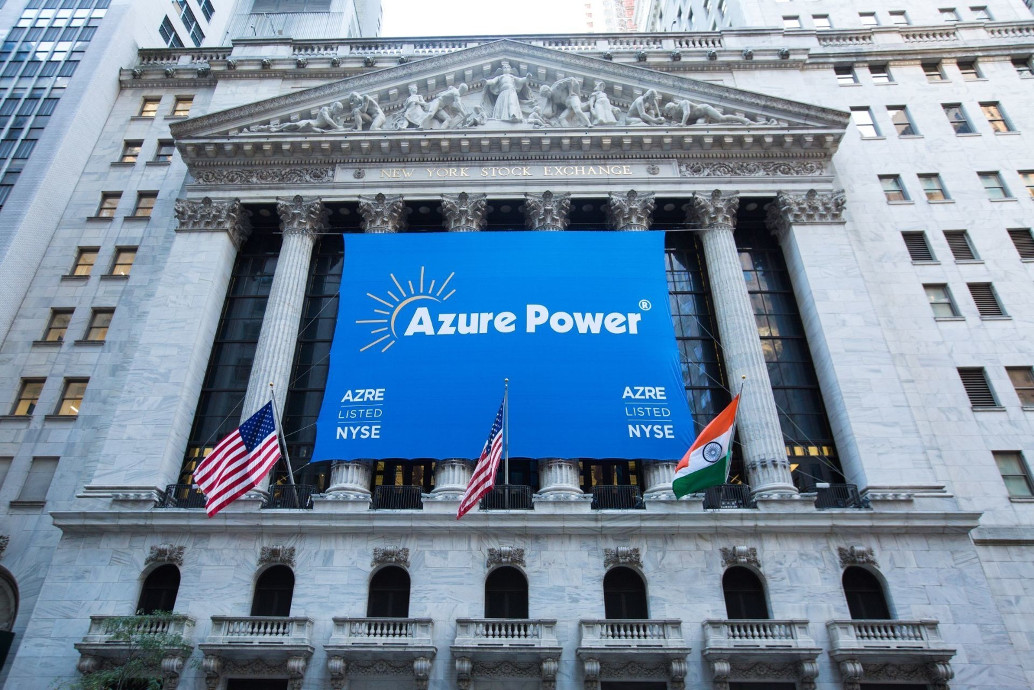When Azure Power secured 100 MW of PV generation capacity in Gujarat for a tariff of just Rs2.45/kWh in September, analysts voiced fears the contract would see the New Delhi-headquartered solar developer lose money on the contract.
With Azure having bid for all the 500 MW being re-tendered by state utility Gujarat Urja Vikas Nigam Ltd (GUVNL) but securing only a fifth of it, solar industry watchers pondered whether the uber low tariff would be feasible.
Azure’s full-year figures, announced to the New York Stock Exchange after hours yesterday, would appear to vindicate the developer, which turned around its first annual profit.
The Rs138,493 figure – a characteristically specific sum in the 146-page form 20-F filing – may appear modest but marks a significant turnaround in fortunes from the Rs10 lakh loss reported a year ago.
The fourth-quarter and full year update warns investors patient enough to plow through a lengthy ‘risk to the business’ section that there is no guarantee of a repeat performance in the year ahead given Azure plans to set to work on additional capacity in 2019-20 but investors may be encouraged to think the business has turned the corner.
Debts rising
Full year revenues rose 29% to just short of a crore with the figure for January to March up 26% on the previous quarter, to Rs28,472 lakh.
With Azure setting its sights on having 1.8-1.9 GW of operating solar assets by this time next year – up from 1,441 MW – the borrowing figures bear out the warning about future profits however.
While the press release summary of the results issued yesterday mentions a rise in interest expenses from Rs5,930 lakh to Rs14,267 lakh “on account of borrowings for new projects”, the balance sheet buried way down the U.S. Securities and Exchange Commission filing fleshes out a fuller picture of Azure’s expansionist policy.
Short-term debt had risen to Rs28 lakh by the end of March, up from just Rs8.35 lakh a year earlier with accounts payable also on the rise during that period, from Rs15 lakh to almost Rs35 lakh. The current portion of long-term debt is even more notable, with a rise from Rs8.7 lakh to a thumping total of almost Rs73 lakh. “Other liabilities” rose from Rs6.1 lakh to more than Rs23 lakh over the 12 months.
With Azure anticipating revenue of Rs1.28-1.34 crore in the current fiscal year, the aforementioned business risks paint an interesting picture of conducting business in India.
The Brexit question
The developer remarks upon the failures of the federal government to achieve its hugely ambitious solar targets with reference to the fact only 47% of the 16.6 GW of new PV envisioned under the nation’s 12th five-year plan – for 2012-17 – was achieved.
Mention is also made of the parlous financial position of state power distribution companies with the remark: “There can be no assurance that the utility companies that are currently our customers will have the resources to pay on time or at all.” Azure posits the possibility of solar incentives being reduced retroactively and also highlights the attempt by GUVNL to renegotiate a power purchase agreement for projects including a 10 MW Azure facility in Gujarat, a case which is now pending at the Supreme Court.
The impact of safeguarding duties applied by the government, and the prospect of them morphing into a more permanent anti dumping charge on Southeast Asian solar imports, rates a mention and there is even a warning about the potential impact of the U.K.’s painfully drawn out Brexit process, not to mention the burgeoning trade war between President Trump and China.
On that question of PPA viability however, Azure said only that a failure to keep costs down could see it secure fewer new projects, adding: “We expect prices for system components to decline as part of our bidding process and if that does not occur our project economics may be harmed and we may need greater subsidies to remain economically viable.”
This content is protected by copyright and may not be reused. If you want to cooperate with us and would like to reuse some of our content, please contact: editors@pv-magazine.com.









By submitting this form you agree to pv magazine using your data for the purposes of publishing your comment.
Your personal data will only be disclosed or otherwise transmitted to third parties for the purposes of spam filtering or if this is necessary for technical maintenance of the website. Any other transfer to third parties will not take place unless this is justified on the basis of applicable data protection regulations or if pv magazine is legally obliged to do so.
You may revoke this consent at any time with effect for the future, in which case your personal data will be deleted immediately. Otherwise, your data will be deleted if pv magazine has processed your request or the purpose of data storage is fulfilled.
Further information on data privacy can be found in our Data Protection Policy.